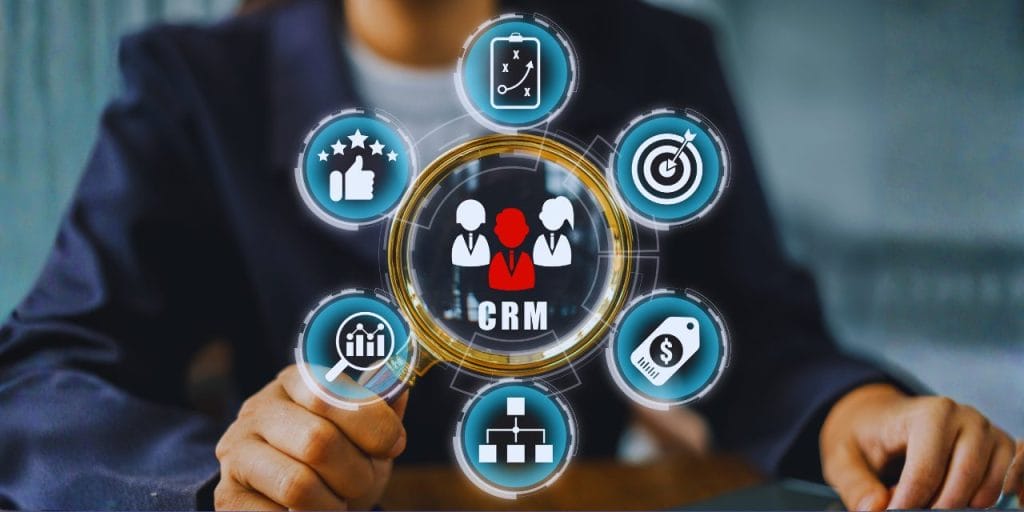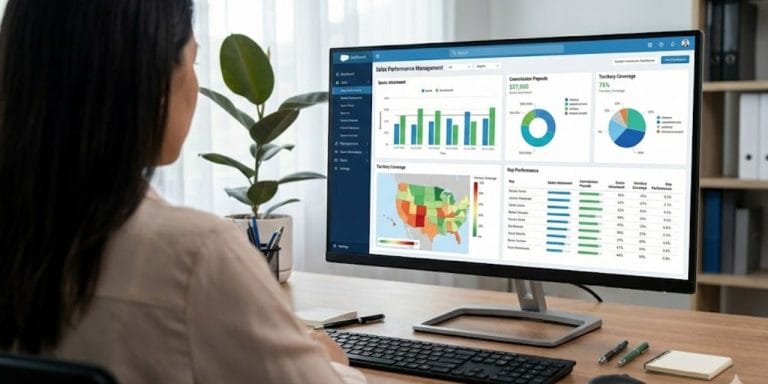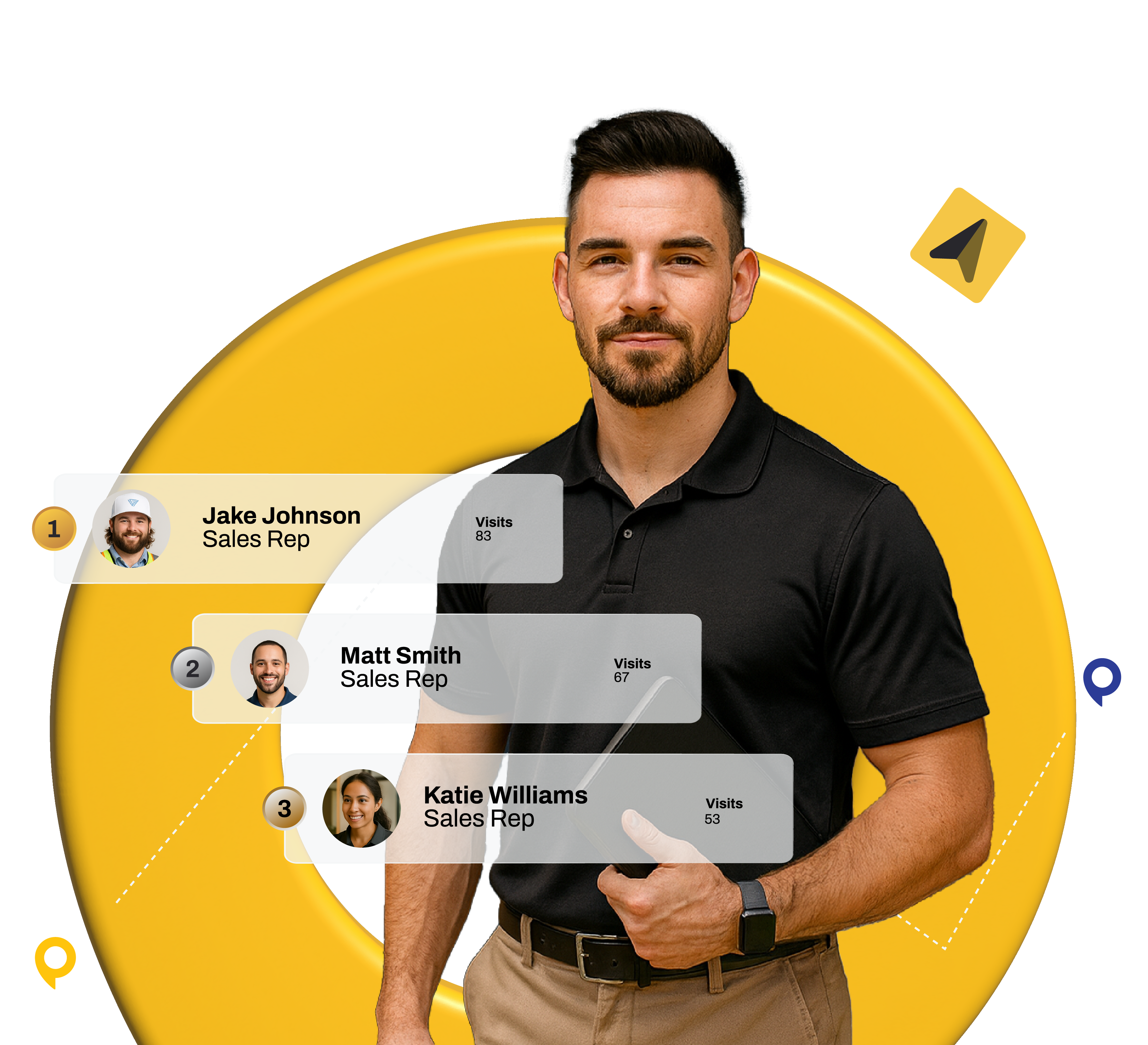Third-party logistics providers (3PLs), freight brokers, and distribution companies face a unique challenge: managing complex sales processes while coordinating intricate supply chain operations. A CRM for logistics transforms how field sales teams at these companies prospect new accounts, nurture customer relationships, and coordinate service delivery across territories.
Unlike traditional CRMs built for office-based sales teams, logistics companies with field sales operations need specialized tools that work while reps are visiting warehouses, touring facilities, and building relationships face-to-face. Whether you’re selling comprehensive 3PL services, brokering freight connections, or managing distribution territories, your sales team needs technology that supports complex, relationship-driven sales processes.
This guide explores why logistics companies with field sales teams need specialized CRM capabilities, how to evaluate the right solution for your operations, and what features drive results across different logistics segments.
Why Logistics Sales Teams Need Field-Ready CRM Software
Each segment of the logistics industry faces distinct field sales challenges, but all share common pain points around mobile operations and complex relationship management.
3PL Sales Challenges: Account executives must understand complex supply chain requirements, coordinate multiple service offerings, and manage sales cycles that often span several months involving multiple stakeholders. Traditional desk-based CRMs can’t handle the operational coordination required between sales promises and fulfillment capabilities.
Freight Broker Operations: Sales teams manage dual relationships – developing shipper accounts while maintaining carrier networks. They need systems that track both sides of transportation marketplace dynamics, capacity management, and pricing optimization in real-time.
Distribution Sales Complexity: Territory-based account management across vast geographic regions requires route optimization, inventory coordination, and relationship tracking across diverse customer segments. Research shows field reps spend only 28-39% of their time actively selling, with the remainder consumed by administrative tasks and travel coordination.
Common Field Sales Pain Points:
- Mobile-first operations requiring instant access to pricing, inventory, and customer data while in the field
- Complex selling cycles requiring multiple facility visits and stakeholder meetings
- Territory management across geographic regions and industry verticals
- Relationship-heavy processes demanding detailed interaction tracking and automated follow-up management
The right logistics CRM eliminates these productivity drains through automation and mobile-first design, allowing teams to focus on what drives results: building relationships and closing deals.
CRM vs. Field Sales Platform: Do You Need Both?
Many logistics sales leaders face a key decision when searching for “CRM for logistics”: Should you enhance your existing CRM (Salesforce, HubSpot) with specialized field sales capabilities, or can a traditional CRM handle everything?
Traditional CRMs Excel At:
- Customer relationship management and contact history
- Deal pipeline management and forecasting
- Integration with business systems (ERP, accounting)
- Comprehensive reporting and analytics
Field Sales Platforms Add:
- Mobile-first functionality for warehouse and facility visits
- Territory mapping and route optimization
- Real-time GPS tracking and activity logging
- Offline capability that syncs when connectivity returns
The Integration Approach: Leading logistics companies often use both systems together. Platforms like SPOTIO integrate natively with Salesforce and HubSpot, creating seamless data flow where field activities automatically populate CRM records, while CRM customer data remains accessible to field teams. This eliminates duplicate data entry while giving each team the tools they need.
Essential CRM Features for Logistics Operations
Mobile-First Functionality
Field sales teams need systems that function reliably in warehouses, distribution centers, and customer facilities where Wi-Fi is often unreliable. Essential mobile capabilities include offline functionality, quick data entry optimized for mobile devices, and instant access to contracts, pricing sheets, and service agreements during customer meetings.
Territory and Route Management
Different logistics segments require different territory approaches:
3PL Territory Design: Based on industry specialization (healthcare, automotive, e-commerce) rather than pure geography, considering service complexity and relationship requirements.
Freight Broker Lane Management: Territory assignment based on shipping lanes, cargo types, and carrier relationships rather than traditional geographic boundaries.
Distribution Territory Optimization: Balance of geographic coverage, account density, and revenue potential to maximize face-to-face selling time.
Quote Generation and Pricing Management
Logistics sales require rapid, accurate quoting during customer meetings. 3PL quoting involves multi-service pricing combining warehousing, fulfillment, and transportation costs. Freight broker pricing requires real-time market rate integration with margin calculations. Distribution pricing needs volume-based pricing tiers with inventory availability checks.
Pipeline Management for Complex Sales Cycles
3PL Pipeline Management: Discovery and needs assessment, solution design and proposals, contract negotiation, and implementation planning phases require systematic tracking and coordination.
Freight Broker Pipeline: Shipper qualification, service trials, contract negotiation, and ongoing relationship management need different tracking approaches.
Distribution Pipeline: Territory prospecting, initial contact, product demonstration, and account growth opportunities require long-term relationship management capabilities.
Vendor Evaluation Criteria for Logistics CRM Solutions
When evaluating CRM options for your logistics operation, use these criteria to ensure you’re comparing solutions effectively:
Mobile Functionality Assessment
- Offline Capability: Can reps access customer data, log activities, and generate quotes without internet connectivity?
- Mobile Interface: Is the mobile experience designed for field use, or just a scaled-down desktop version?
- GPS Integration: Does the system track location data and integrate with mapping for route optimization?
Industry-Specific Features
- Quote Generation: Can the system handle complex pricing scenarios for your specific logistics segment?
- Integration Capabilities: How easily does it connect with a Transportation Management System (TMS), Warehouse Management System (WMS), or Enterprise Resource Planning (ERP) system already in use?
- Compliance Features: Does it support industry requirements for documentation, carrier verification, or regulatory reporting?
User Adoption Factors
- Training Requirements: How much time is needed to get field teams productive on the system?
- User Interface Design: Is it intuitive for reps who spend limited time on administrative tasks?
- Change Management Support: What resources does the vendor provide for rollout and adoption?
Scalability and Total Cost
- Growth Accommodation: Can the system handle increases in users, data volume, and geographic expansion?
- Total Cost Analysis: Include licensing, implementation, training, integration, and ongoing support costs
- Vendor Stability: Evaluate the vendor’s financial health and commitment to your industry segment
Key Questions for Vendor Demos
For Mobile Functionality:
- “Show me how a rep would generate a quote while standing in a customer’s warehouse with poor Wi-Fi”
- “How does territory assignment work when accounts span multiple geographic regions?”
- “What happens to data entered offline if the app crashes before syncing?”
For Integration:
- “How long does it typically take for data to sync between your system and our existing TMS?”
- “Can you show me exactly what data flows between systems and what requires manual entry?”
- “What happens if our TMS or WMS vendor changes their API?”
For Implementation:
- “What does the typical rollout timeline look like for a logistics company our size?”
- “How do you handle data migration from our existing systems?”
- “What training is required, and how do you measure adoption success?”
CRM Use Cases by Logistics Segment
3PL Account Development and Management
Third-party logistics providers need systematic approaches to identify manufacturers, retailers, and distributors requiring outsourced fulfillment services. Complex 3PL sales cycles involve facility tours, operational assessments, and stakeholder presentations across multiple departments.
Key requirements include multi-service quote generation, stakeholder relationship mapping, implementation timeline coordination, and service level agreement tracking. The ability to document and share operational capabilities during the sales process directly impacts closing rates.
Freight Broker Marketplace Management
Freight brokers manage dual sales processes – developing shipper relationships while maintaining carrier networks. This unique position requires CRM functionality that tracks both sides of the transportation marketplace.
Shipper development focuses on volume projection, shipping pattern documentation, and decision-maker relationship building. Carrier relationship management involves capacity monitoring, performance tracking, and rate negotiation history. Integration with real-time market pricing data enables competitive quote generation during shipper meetings.
Distribution Territory Optimization
Distribution companies manage extensive geographic territories with diverse customer segments requiring different service levels. Effective territory management balances account value, geographic efficiency, and rep specialization.
Priority features include geographic territory mapping, customer segmentation capabilities, inventory availability integration, and route optimization for efficient territory coverage. The goal is ensuring high-value accounts receive appropriate attention while maintaining comprehensive market coverage.
How a Logistics CRM Improves Customer Experience
Logistics customers expect responsive service, transparent communication, and quick issue resolution regardless of which segment they’re working with. A specialized logistics CRM enables teams to meet these expectations consistently.
Proactive Communication: Complete service history enables logistics sales teams to anticipate customer needs and recommend solutions before problems arise. When shipping volumes change or new requirements emerge, informed account teams can respond with relevant capabilities.
Faster Response Times: Mobile access to customer data means field reps can address questions and concerns immediately rather than promising to “get back to you” after returning to the office. This responsiveness builds trust across all logistics relationships.
Coordinated Service Delivery: Integration between CRM and operations data helps logistics sales teams coordinate service delivery with fulfillment teams, ensuring promises made during the sales process align with operational capabilities.
Choosing the Right CRM for Your Logistics Operation
The logistics CRM market offers various solutions optimized for different business models and operational requirements. When evaluating options, focus on vendors with proven experience in your specific logistics segment and strong mobile capabilities.
Evaluation Process:
- Document Current Challenges: Identify specific pain points your field sales team faces daily
- Define Success Metrics: Establish measurable goals for what improved CRM functionality should achieve
- Assess Integration Needs: Evaluate how well potential solutions connect with existing systems
- Test Real-World Scenarios: Conduct trials using actual field sales situations your team encounters
- Calculate Total Investment: Consider all costs over a 3-5 year period, not just initial licensing fees
For logistics companies with field sales teams requiring mobile-first functionality, territory management, and industry-specific features, evaluate solutions that combine traditional CRM capabilities with field sales optimization. Companies like SPOTIO provide specialized field sales platforms that integrate with existing CRM systems, offering the best of both approaches.
Ready to evaluate CRM options for your logistics operation? Request a demo of SPOTIO to see how field-focused technology can complement your existing systems and transform your sales performance.
FAQ
What is a CRM in logistics and how does it differ from general CRM?
A logistics CRM is either a specialized platform built specifically for transportation companies or a general CRM customized for logistics operations.
Logistics-specific CRMs like SCRM, Magaya, or Pipeline CRM include built-in features for freight quoting, shipment tracking, carrier relationships, and compliance requirements that general CRMs lack.
General CRMs like Salesforce, HubSpot, or Microsoft Dynamics offer broader business functionality but require customization to handle logistics-specific processes like freight pricing, load management, and carrier integration.
Both approaches can work depending on your company’s size, complexity, and whether you need specialized logistics features or prefer the flexibility of a general platform that can grow with your business needs.
How do CRM needs differ between 3PLs, freight brokers, and distributors?
3PLs need multi-service quote generation and complex stakeholder management for longer sales cycles involving warehousing, fulfillment, and transportation services. Freight brokers require dual-sided marketplace management tracking both shippers and carriers with real-time pricing integration and load matching capabilities. Distributors focus on territory optimization, inventory integration, and high-volume relationship management across geographic regions with route planning features.
Should we use a field sales platform in addition to our existing CRM?
This depends on how much field selling your team does. If your reps frequently visit customer facilities, manage territories, or need mobile access to customer data, a field sales platform like SPOTIO can integrate with both logistics-specific and general CRMs to provide specialized mobile functionality while maintaining your customer database and reporting structure.
What should we ask CRM vendors during the evaluation process?
For logistics-specific CRMs, focus on industry feature completeness (“Show me freight quoting workflows”), implementation timeline (“How quickly can we go live?”), and vendor expertise (“What other 3PLs use your platform?”). For general CRMs, emphasize customization requirements (“What’s involved in configuring logistics workflows?”), integration capabilities (“How do you connect with TMS systems?”), and total cost of ownership (“What are the ongoing customization and maintenance costs?”).
How long does CRM implementation typically take for logistics companies?
Logistics-specific CRMs typically implement faster due to pre-built workflows, often 2-4 months for basic deployment. General CRMs require more customization time, typically 4-8 months depending on complexity. Both approaches benefit from realistic planning, adequate user training, and phased rollouts to ensure adoption success.
What are the most important features for logistics field sales teams?
Essential features include mobile functionality with offline capability, territory and route management, integration with existing logistics systems (TMS for shipment tracking, WMS for inventory, ERP for business operations), quote generation for complex pricing, and pipeline management tailored to your sales cycle length. The specific priority depends on whether you choose a logistics-specific platform with built-in features or a general CRM requiring customization.




